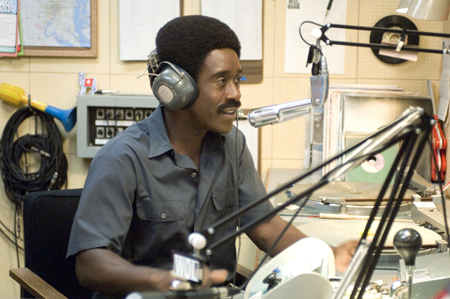|
Reviews of Recent Independent, Foreign, & Documentary Films in Theaters and DVD/Home Video
Directed by: Kasi Lemmons. Written by: Michael Genet & Rick Famuyiwa, based on a story by Genet. Produced by: Mark Gordon, Sidney Kimmel, Joe Fries & Josh McLaughlin. Director of Photography: Stéphane Fontaine. Edited by: Terilyn A. Shropshire. Music by: Terence Blanchard. Country of Origin: USA. 118 min. Rated R. Released by: Focus Features. With: Don Cheadle, Chiwetel Ejiofor, Taraji P. Henson, Martin Sheen, Cedric the Entertainer, Vondie Curtis Hall & Mike Epps.
In 1966, Ralph Waldo “Petey” Greene (Don Cheadle) spins discs while serving time for armed
robbery and first crosses paths with buttoned-down Dewey Hughes (Chiwetel Ejiofor) when the latter reluctantly visits his incarcerated brother. But after
Hughes becomes the last-ditch and first black program director for the failing, white-owned WOL-AM in Washington, DC, Greene, surprisingly released from prison,
literally lays persistent siege to the station for an on-air job and wins.
Together the two men don’t just controversially shift the station from Nat King Cole to the sounds of the raucous 1960’s. Greene plays gritty soul music,
heard in the acutely selected soul classics on the soundtrack, to comment on race relations as he riffs and ruffles feathers, taking on the
smoothed-out Motown sound. Talk to Me’s studio scenes rank with the best representations of the impact of radio, usually seen through
white DJs in American Hot Wax, Good Morning, Vietnam, and Pump Up the Volume. Unlike the later shock jocks, Greene’s talk radio
resonates with community activism and abolishes any sense of minstrelsy.
The film’s first half establishes the manager/employee conflict with very earthy, very pointed humor, using terms considerably more inflammatory
than a recent debate about hip-hop language on Oprah. The flamboyant Greene calls Hughes a “Sidney Poitier sell out” with comparative
analytical variations of the “N” word.
In the second half, Greene and Hughes come to a creative understanding, repeated a couple of times, as Hughes summarizes “You say the things I’m
afraid to say,” and Greene rejoins “And you do the things I’m afraid to do.” Sharply sobering up the tone in the long film is the assassination of
Dr. Martin Luther King. The all-night vigil on the air and at a James Brown concert the next night, within a city under National Guard-enforced
martial law, helps to cool and re-channel the anger of the rioters. Events outside the studio are vividly re-created through excellent commingling of
period footage with Stéphane Fontaine’s richly saturated cinematography and hand-held camera work.
Hughes then takes on the ambitious management of Greene’s career, which branches out to stand-up comedy and onto television. Actual
Tonight Show footage from the Carson estate archive adds to the effective verisimilitude, even if facts are exaggerated for a dramatic
climactic showdown.
Cheadle adds considerable subtlety to a colorful character that could have been played for a lot of laughs, like in the Ocean’s series, or with
pathos. Almost from the beginning, Greene’s insecurities humanize his rants and strut, even as there’s no shying away from his drinking problems.
In response, Ejiofor’s changing inflections of African-American vernacular are as significant as the changes in his body language, hair length, and
wardrobe. (His British vowels only sneak in a couple of times in this, his biggest American role.) Though the script is co-written by Hughes’ son
Michael Genet, who also years later worked at WOL, Hughes’ personal life isn’t portrayed, but revealed through two lengthy monologues and a couple of
strained visits with his jailed brother.
As part of the marvelous evocation of a period R&B station, Cedric the Entertainer eschews his customary jive, which ironically sounds like a
descendant of Greene’s patter, as “The Nighthawk,” a smooth late-night voice par excellence, while Vondie Curtis Hall nattily embodies
“the sunny sweet cotton candy sounds” of a “relic of a bygone age,” as Hughes describes him. The spectacular costumes by Gersha Phillips
(Cheadle alone has three dozen costume changes) as well as the hair styles deliciously capture the period plumage.
Nora Lee Mandel
|

